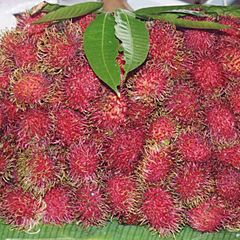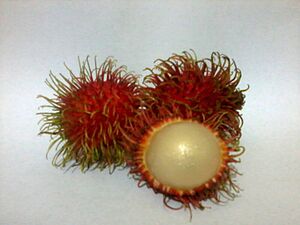Rambutan facts for kids
Quick facts for kids Rambutan |
|
|---|---|
 |
|
| Rambutan fruits | |
| Conservation status | |
| Scientific classification | |
| Kingdom: | |
| Division: | |
| Class: | |
| Order: | |
| Family: | |
| Genus: |
Nephelium
|
| Species: |
N. lappaceum
|
| Binomial name | |
| Nephelium lappaceum |
|
The rambutan (Nephelium lappaceum) is a special tree that comes from Southeast Asia. The tasty fruit that grows on this tree is also called rambutan. It looks a bit like a Lychee fruit.
The word "rambutan" actually means "hairy" in the Malay language. When you see the fruit, you'll understand why! It has a unique, hairy-looking skin.
Contents
What is a Rambutan?
A rambutan fruit is usually about the size of a golf ball. When it's not ready to eat, its skin is green. But once it's ripe, the outside turns a bright red color. Sometimes, you might also see yellow or orange rambutans.
Inside, the fruit has soft, white flesh. This part is sweet and juicy. It usually has one large seed in the middle, which you don't eat.
Where Do Rambutan Trees Grow?
Rambutan trees grow naturally in warm, tropical places. They are originally from Indonesia. You can find many rambutan trees growing wild in countries like Thailand, Vietnam, and the Philippines. They also grow in other parts of Southeast Asia.
Besides these places, Sri Lanka is also well-known for growing lots of rambutans. These trees love sunny weather and lots of rain to grow big and strong.
How Do We Use Rambutan Fruit?
Rambutan fruits are very popular to eat fresh. People often peel them and enjoy the sweet, juicy inside as a snack. They are also used in different ways:
- Jams and Jellies: The sweet flesh of the rambutan is great for making delicious jams and jellies.
- Canned Fruit: You can find rambutans preserved in cans, often in a sweet syrup. This makes them easy to enjoy any time of year.
- Desserts: Sometimes, rambutans are added to fruit salads or other sweet desserts.
| Nutritional value per 100 g | |
|---|---|
| Energy | 343 kJ (82 kcal) |
|
20.87
|
|
| Dietary fiber | 0.9 |
|
0.21
|
|
|
Protein
|
0.65
|
| Vitamins | Quantity
%DV†
|
| Vitamin A equiv.
beta-Carotene
|
0%
0 μg
0%
2 μg |
| Vitamin A | 3 IU |
| Thiamine (B1) |
1%
0.013 mg |
| Riboflavin (B2) |
2%
0.022 mg |
| Niacin (B3) |
8%
1.352 mg |
| Pantothenic acid (B5) |
0%
0.018 mg |
| Vitamin B6 |
2%
0.020 mg |
| Folate (B9) |
2%
8 μg |
| Vitamin B12 |
0%
0.00 μg |
| Vitamin C |
6%
4.9 mg |
| Minerals | Quantity
%DV†
|
| Calcium |
2%
22 mg |
| Iron |
3%
0.35 mg |
| Magnesium |
2%
7 mg |
| Manganese |
16%
0.343 mg |
| Phosphorus |
1%
9 mg |
| Potassium |
1%
42 mg |
| Sodium |
1%
10.9 mg |
| Other constituents | Quantity |
| Water | 78.04 g |
|
Nutrient values and weights are for edible portion
|
|
| †Percentages estimated using US recommendations for adults. | |
Rambutan fruits are not just tasty, they also have some good things for your body, like Vitamin C. This makes them a healthy and refreshing treat!
Images for kids
See also
 In Spanish: Rambután para niños
In Spanish: Rambután para niños
 | Bayard Rustin |
 | Jeannette Carter |
 | Jeremiah A. Brown |











